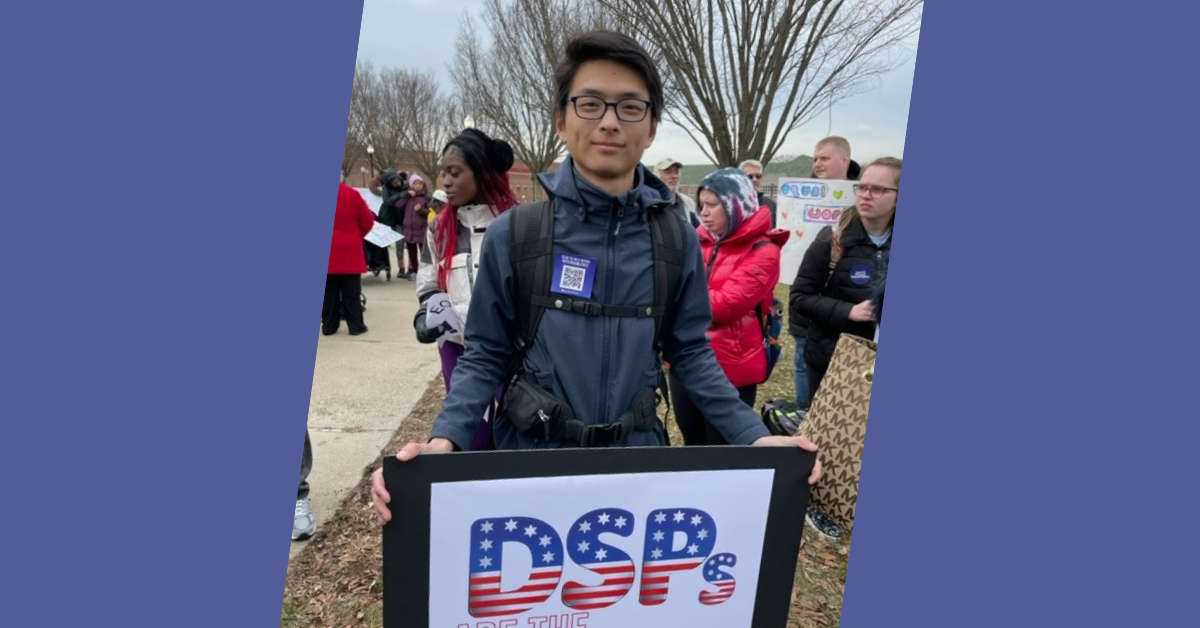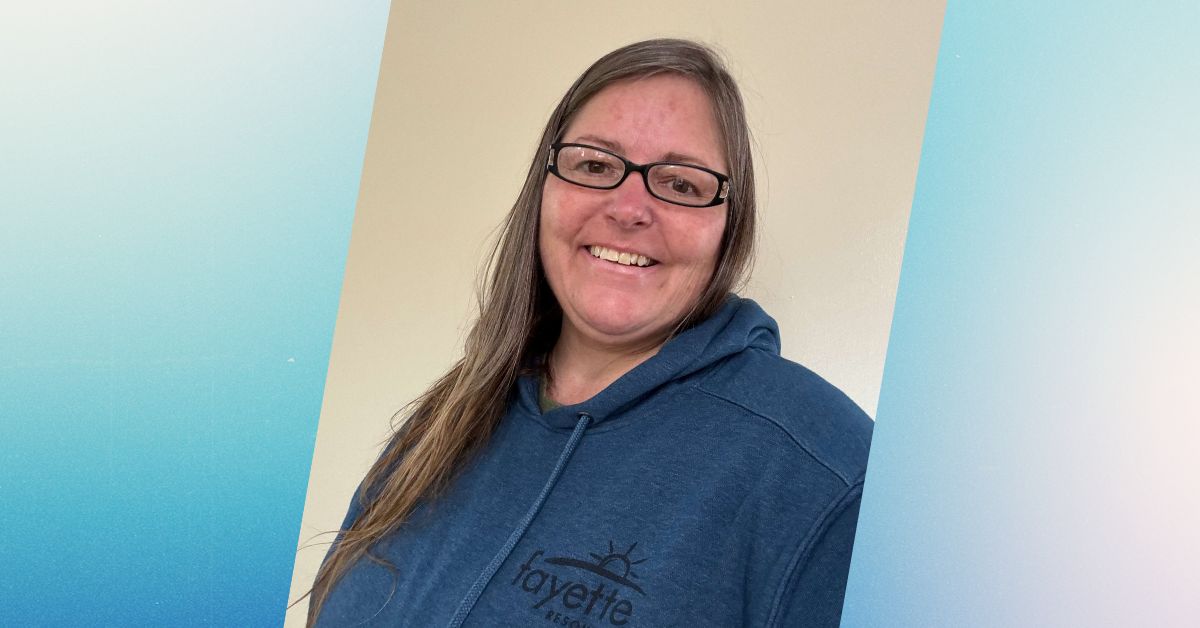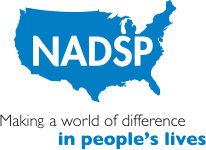
NADSP E-Badge Earner of the Month: Michael Huang
Congratulations to Michael Huang who has been selected as the March 2023 NADSP E-Badge Academy Earner of the Month.We are recognizing Michael for his excellent ‘Self Advocate Ally’ E-Badge submission. This badge represents a Direct Support Professionals’ work in supporting the individual to advocate for him or herself by encouraging the individual to speak for his or her self. This badge is part of the Empowerment and Advocacy CMS Core Competency. It also aligns with the NADSP Competency Area of Participant Empowerment.
Michael works as a Community Support Professional (CSP) at AHRC New York City through the Melissa Riggio Higher Education Program at the College of Staten Island. The mission of AHRC NYC is to advocate for people who are neurodiverse to lead full and equitable lives.
Michael’s Experiences With The NADSP E-Badge Academy
The National Alliance for Direct Support Professionals (NADSP) recently asked Michael about his experiences with the NADSP E-Badge Academy. The questions covered how he carries out his work as a direct support professional, the skillsets he demonstrates on a daily basis, the impact that the E-Badge Academy has had on his professional recognition, and how he gets credit for competency.
Describe the story you shared in carrying out that competency:
The story that I shared in carrying out this competency is a recounting of when a person I support approached me to talk about his ComHab program. The topic was on group activities and how there are activities that he does not want to partake in. I asked him if he had alternatives to the activities offered during those instances, and he replied that he would rather not be included in the activity, instead, doing his own thing. I encouraged him to voice his preferences, or offer an alternative, as having multiple options of activities is a right of all people, especially people with disabilities that should be honored and respected.
A few days following our conversation, the person I support approached me, enthusiastically talking about how when his ComHab program held a group activity, and how he spoke up and advocated for himself. He offered an alternative action that he would prefer to the planned activity, which was approved by the activity coordinator, after which he felt more relieved about speaking up for his preferences.
Why is this competency so important to DSPs?
This competency is critical to the role DSPs play when supporting people with disabilities because people with disabilities are first and foremost, PEOPLE first before anything else, so they are entitled to the same rights as everyone else: choosing what they want to do. Acknowledging that people with disabilities have their own preferences and encouraging them to bring that to the attention of the DSP(s) who support them is vital to ensuring that person-centered support is being provided. Otherwise, if the person receiving support does not feel comfortable expressing their preferences, then is it really any different from the grotesque conditions at WIllowbrook? As DSPs who are committed to the NADSP Code of Ethics, the person being supported directing their own lives as much as possible is of the utmost concern, and that starts with self-advocacy.
How have you used this competency in your work?
I have used this competency in my work, as I often find myself asking the people I support what they would like to do after giving them options. There were many occasions where I would see a participant that seemed uncomfortable with the choice that everyone else voted on. I would notice that, encouraging that individual to let me know what was wrong, after which I would listen, seeing if I could find an alternative to the option that was chosen so everyone would be okay with it. After landing on an alternative, I would confirm it with the rest of the participants, ensuring that the alternative was acceptable.
How can other DSPs replicate your practices?
Other DSPs can replicate my practice by encouraging the people they support to express their own preferences, thus allowing them to direct their own lives and yield a satisfactory outcome for that person.
How does the NADSP E-Badge Academy benefit your agency?
The NADSP E-Badge Academy benefits my agency by ensuring that everyone is able to provide quality support while also allowing anyone who is interested in becoming a DSP to become certified as one.
How does NADSP E-Badge Academy benefit the people you support?
The NADSP E-Badge Academy benefits the people I support by providing a framework by which DSPs and supervisors are able to provide quality support to people with disabilities. The NADSP Code of Ethics is a resource I frequently reference when writing testimonials and internalize when providing support. The NADSP E-Badge Academy exists to certify DSPs who are committed to the NADSP Code of Ethics, so people being supported are able to have quality lives.
What does the future hold for your involvement in the NADSP E-Badge Academy?
In the future, I hope my involvement in the NADSP E-Badge Academy is able to benefit others who are interested in pursuing certification to become a DSP. Through writing testimonials, others can reference approved testimonials for pointers to assist them in getting their certification, where otherwise they would be denied the approval due to poor conveying of the professional experience.
How has NADSP E-Badge Academy affected your professional image?
The NADSP E-Badge Academy has affected my professional image through my certification as a DSP. Knowing that DSPs certified through the NADSP E-Badge Academy are committed to the NADSP Code of Ethics, it puts my mind at ease, understanding that those DSPs are able to provide quality support to people with disabilities.
I do feel more skilled, though I do also feel that the NADSP E-Badge Academy acts as a documentation of skills that the DSP is able to perform proficiently. Testimonials are personal accounts that differ between each person and scenario described, which serve both as a form of documentation and a practice in HIPAA regulations.
How does NADSP E-Badge Academy give you credit for competency?
The NADSP E-Badge Academy gives me credit for competency by approving the testimonials I submit, which then results in being given the corresponding badge of the testimonial. Additionally, after having met the requirements of specific DSP certifications and accumulated enough badges, the DSP can apply for the appropriate DSP certification.
The NADSP E-Badge Academy
The NADSP E-Badge Academy offers Direct Support Professionals (DSPs) and Frontline Supervisors (FLSs) the ability to earn national certification through stackable electronic badges. These badges demonstrate the knowledge, skills, and values that these professionals utilize every day, recognizing the professional development that might otherwise go unacknowledged. Through the NADSP E-Badge Academy, DSPs and FLSs are acknowledged for the experience and education that they bring to the human services field.
NADSP E-Badge Academy Earners Of The Month

NADSP E-Badge Earner of the Month: Jennifer Hardin

NADSP E-Badge Earner of the Month: Julius Nyabinda

NADSP E-Badge Earner of the Month: Rhoda Mullen


